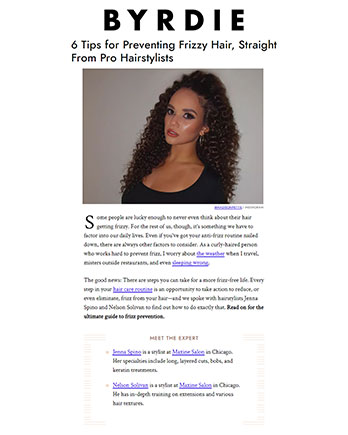Byrdie October 2, 2023
BYRDIE
Hair
6 Tips for Preventing Frizzy Hair, Straight From Pro Hairstylists
Some people are lucky enough to never even think about their hair getting frizzy. For the rest of us, though, it's something we have to factor into our daily lives. Even if you've got your anti-frizz routine nailed down, there are always other factors to consider. As a curly-haired person who works hard to prevent frizz, I worry about the weather when I travel, misters outside restaurants, and even sleeping wrong.
The good news: There are steps you can take for a more frizz-free life. Every step in your hair care routine is an opportunity to take action to reduce, or even eliminate, frizz from your hair—and we spoke with hairstylists Jenna Spino and Nelson Solivan to find out how to do exactly that. Read on for the ultimate guide to frizz prevention.
MEET THE EXPERT
Jenna Spino is a stylist at Maxine Salon in Chicago. Her specialties include long, layered cuts, bobs, and keratin treatments.
Nelson Solivan is a stylist at Maxine Salon in Chicago. He has in-depth training on extensions and various hair textures.
Wash and Condition With Cool Water
Avoiding hot water when washing and conditioning your hair is the first step to preventing frizz. "Don't shower with hot water because this will dry the hair out more," instructs Spino, who also recommends a cool water rinse after conditioner to seal the cuticles with as much moisture as possible. And, of course, you should be using shampoos and conditioners intended to moisturize your hair, not strip it of vital oils. People with frizzy hair should steer clear of clarifying shampoo unless absolutely necessary.
Add a Mask to Your Routine (Occasionally)
When times are very tough—or, well, very dry—Spino suggests swapping out your standard conditioner for a mask and using that until your hair is feeling better again. But make sure to quit while you're ahead: Switch back to your regular conditioner as soon as your hair feels decent again so that you don't end up with different problems caused by over-conditioning.
Use the Right Towel to Dry Your Hair
It's likely not news anymore, but the right towel material to dry your hair can make a big difference in eliminating frizz. Spino suggests a microfiber material or using an old t-shirt: "This causes less friction, thus less frizz," she says. Once you make the switch, you're bound to notice a difference immediately.
Pick a Leave-In Product
After towel drying, Solivan recommends anyone with high-porosity or coarse hair apply a leave-in conditioner throughout their strands, section by section. Then, "after applying, allow your hair to air dry and see the results. You will have hair that is moisturized and naturally air-dry styled."
"For more curl definition, I recommend individually twisting or curling your hair while applying [leave-in conditioner] section by section," says Solivan.
Use a Heat Protectant
If a leave-in is too heavy for your hair type, Solivan suggests a heat protectant instead; Spino likes these for all hair types. "Apply the heat protectant throughout the whole hair shaft, then section by section, use your favorite brush to smooth and dry the hair," advises Solivan.
For curly hair, Spino recommends air drying or, if you do diffuse, stopping when the hair is only 70 percent dry to keep from creating new frizz.
Sleep on Silk—and Keep Your Hands Off Your Strands
Sleeping on a silk pillowcase minimizes friction, which can help prevent frizz. If you can't spring for the cost of that, satin is a great second choice.
In addition, Spino says you'll want to avoid touching your hair too much. Playing with your hair can add the wrong oils and mess with your curl pattern if you have curly hair (and make it greasy if you don't).
FAQ
What causes frizzy hair?
"Frizz is caused by dryness within the hair shaft," explains Solivan. "Our hair shaft can be compared to shingles on a roof... when the hair is damaged and dry, these shingles fray, causing frizz." Additionally, any friction can cause frizz, and it can occur whenever our hair is dry, says Spino.
Any type of hair can get frizzy, but it's common for curly or coily hair to be frizzier than straight hair. That's because these hair types are usually dryer than straight or wavy hair types.
Is frizzy hair unhealthy?
Hair being frizzy doesn't mean it's unhealthy. It may be dry, or your frizz might be caused by the weather or friction. It's worth looking into, but frizz can happen to perfectly healthy hair.
How often should you condition frizzy hair?
You should condition frizzy hair every time you wash it. You may also want to move to a co-washing or occasionally wetting and conditioning without washing.
Can you get rid of frizzy hair?
Yes, you can get rid of frizz. However, it's often a pretty temporary situation and may return. Every time you wash your hair, go to sleep, or step out into the world, the opportunity for frizz re-emerges, and you may need to fight it again. The more you follow the steps above, the likelier you'll be able to keep frizz at bay. By taking action to keep your hair properly moisturized, you can reduce the occurrence of frizz long-term.

